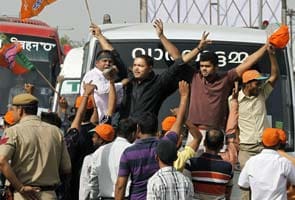
The Left and the Right today joined hands during the Bharat bandh that was called in protest against the recent hike in petrol price. But the response to the nationwide bandh called by the Bharatiya Janata Party (BJP) was mixed as most cities remained largely peaceful barring a few pockets which witnessed stray incidents of violence.
Here are the top 10 developments of the bandh:
Maharashtra has, so far, felt the maximum impact of the bandh. Mumbai has reported incidents of stone-pelting with at least 68 buses being damaged and many set on fire. Local trains, the city's lifeline, have been running way below the usual capacity. Fewer taxis and autos have been plying on the roads. At least 48,000 police personnel have been deployed in sensitive areas across the city to prevent any untoward incident.
Elsewhere in the state, buses have been stopped from plying in Satara and Nagpur; business establishments too have been forced to shut down. In Akola, protestors tried to stop Chief Minister Prithviraj Chavan's convoy.
In the national capital, transport and traffic has been hit with BJP activists blocking several crucial junctions and staging demonstrations in the city. Protestors have blocked an arterial road that connects Ghaziabad to Delhi, causing much inconvenience to office-goers.
This has had a cascading effect on metro services in the capital. Major crowding and delays have been reported at several metro stations across the city.
Several BJP leaders including Ananth Kumar and Vijay Goel have courted arrest in Delhi. The Left's Prakash Karat, Sitaram Yechury and D Raja have also been taken into custody for trying to enforce the bandh. In Bihar, Sharad Yadav, who is the president of the ruling Janata Dal (United) and the Convenor of the BJP-led National Democratic Alliance, was detained in Saharsa while BJP leader Shahnawaz Hussain was also detained in Bhagalpur.
The impact of the nationwide bandh has also been felt in West Bengal ruled by the Trinamool Congress, an ally of the Congress at the Centre. Fewer people have been out on the roads in Kolkata with areas like the Howrah Bridge being blocked by demonstrators.
The protests have been triggered by a hike in petrol price by almost Rs 7.50 including taxes that were effected last week. The move met with stiff opposition and criticism not just from the opposition, including the BJP, but also from UPA allies like the Trinamool Congress and the DMK.
In Uttar Pradesh, the ruling Samajwadi Party has also registered its opposition to the petrol price hike by calling for a statewide bandh. In Allahabad, SP activists blocked railway tracks and burnt effigies of Prime Minister Manmohan Singh. The Akhilesh Yadav-led government has expressed its inability to reduce the value added tax (VAT) on petrol on the lines of some Congress-ruled states like Delhi, Kerala and Uttarakhand to neutralise the impact of the hike.
The bandh has disrupted normal life in parts of BJP-ruled Karnataka where three buses have been set on fire. About a dozen others have been stoned, forcing authorities to withdraw bus services in the Bangalore. Public transport has been hit and shops and business establishments have remained shut in several parts of the state.
The shutdown has also affected train services in Bihar and Jharkhand. Three Rajdhani trains - Delhi-Howrah, Delhi-Sealdah and Delhi-Bhubneshwar - have been stopped near Koderma. Meanwhile, JD(U) workers have staged a rail roko in Patna and local trains have been affected.

